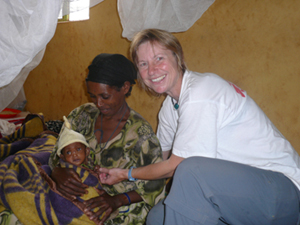 |
|
Jill with a mother and her child, who is being treated in an MSF feeding center in Ethiopia. July 2008. [MSF]
|
Jill Clare Mowbray is a British nurse working on the nutritional emergency program in southern Ethiopia. She was in charge of the outreach therapeutic program (OTP) of Hadero, SNNP region, one of the districts where MSF has cared for most severely malnourished patients.
Jill's Ethiopian Diary - Fighting the food crisis
30/07/2008
The journey from Shinshicho to Hadero takes thirty minutes along a pot-holed dirt road.
It's difficult to believe that there are so many people starving in the area when you see farmers tending their crops every day. Cattle and goats are a daily scene. Everything is lush, green and quite beautiful.
With a team of over 25 national staff, we see over 700 people every day in the Outreach Therapeutic Program (OTP), six days a week. Every week we transfer between six to ten children to the Stabilisation Centre (SC) in Schinshicho for severe acute malnutrition and medical complications requiring intensive therapy.
The rainy season is well underway now and we are expecting to see an increase in malaria and pneumonia. Often children will arrive at the OTP severely dehydrated, hypothermic, suffering with diarrhoea, anaemia and often with oedema, all complications of malnutrition.
Families have very little food. Mothers will walk 2-3 hours with their children and stay at the OTP, waiting all day sometimes in the hope of receiving help from us. It is very difficult to triage and spot the very sick, in a sea of faces, holding their arms out to you in desperation, tugging at your clothing as you try and pass amongst them, searching.
People wait in the rain for hours. Children dressed only in a t-shirt stand shivering, bare foot in the mud. In my first week at Hadero I saw two children die due to severe malnutrition, dehydration and hypothermia.
When I see the very sick children for the first time in the OTP, they seem so frail. We transfer them as quickly as possible after an initial weight, height and medical assessment, wrapping them in emergency blankets and hats.
Every day I visit the Stabilisation Centre to check the progress of the severely malnourished children. Many children sent for intensive therapy are below 70% of their target weight, which is 85% of the median weight. With the correct nutritional treatment oedema starts to disappear within the first few days and the very thin (marasmic) children change from looking like old men to children again.
Seeing the children get well, gain weight and start smiling at you after only a few days is very rewarding. Sometimes the only way to recognize the children I have transferred to the Stabilisation Centre is by the hats they wear. A friend's Mum made them for me to bring out and they have certainly helped to save lives.
Our main objective now is to try and prevent severe cases occurring by starting supplementary feeding for moderately malnourished children and pregnant and breastfeeding females. They receive rations of a corn and soya blend with oil and sugar.
We are even seeing cases of people lending their children, or having them stolen so families who do not meet the criteria for admission to the program can access food. This shows the people's desperate search for food assistance.
Thousands are in need, but just the most at risk could be admitted. Many are surviving on very small amounts of basic local foods and unless their crops are successful soon, and food prices are affordable, we will see many more moderate and severe cases.